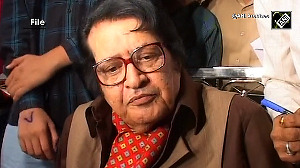Gandhi was shot dead by her Sikh bodyguards at her residence, apparently to avenge Operation Bluestar in June 1984 in which the Indian army stormed the Golden Temple in Amritsar to kill the terrorists hiding inside the complex.
The Justice Nanavati Interview
Gandhi was killed on October 31, 1984, following which anti-Sikh riots broke out in several towns and cities across the country -- New Delhi saw the worst of it all.
Justice Nanavati submitted his report to the home ministry on February 9, 2005. The report along with the government's Action Taken Report was tabled in Parliament on Monday.
These are some of the highlights:
1. Observation/recommendation: Police subinspector Hoshiar Singh and his men did not protect a gurdwara and did not disperse the mob that had assembled there to unleash violence.
Action taken: Action cannot be taken because Singh and the two constables are now retired. The government will consult the law ministry if action can be taken against them.
2. Observation/recommendation: Evidence against Congress leader Dharam Das Shastri. He instigated Tek Chand Sharma and Rajinder Singh to attack Sikhs.
Action Taken: Tek Chand Sharma and Rajinder Singh were convicted by the lower court. Shastri not named as an accused in this case. The government will look into it.
3. Observation/recommendation: Credible evidence against Jagdish Tytler (now minister for overseas Indian affairs) that very probably he had a hand in organising attacks on Sikhs. Further action recommended as may be found necessary.
Action taken: The government says the commission is not certain that Tytler had a role in organising the attacks on Sikhs and in the context of the judicial verdicts on the incidents mentioned in the commission's report, any further action will not be justified.
4. Observation/recommendation: Inquiry against subinspector Mange Ram for dereliction of duty.
Action taken: Legal hurdles in inquiry because he has retired from service.
5. Observation/recommendation: Action against following officers as they were negligent in performing their duties:
Deputy Commissioner of Police of South district Chander Prakash; Station House Superintendent of Srinivaspuri O P Yadav; Station House Superintendent of Delhi Cantt Rohtash Singh; Station House Superintendent of Nizamuddin Ram Phal; Subinspector Ved Prakash; and head constables Shakti Singh and Mahinder Singh.
Action taken: No evidence against some policemen while others are retired.
6. Observation/recommendation: Investigate those cases in which (Congress leader and now lawmaker) Sajjan Kumar is an accused.
Action taken: Seven cases against Sajjan Kumar. Two of them do not relate to the 1984 riots. No evidence in others. Therefore, there is no justification to reopen these cases.
7. Observation/recommendation: Explanation given by then Lieutenant Governor P G Gavai is not satisfactory. He did not give as much importance to law and order as the situation deserved. He cannot escape the responsibility of police failure.
Action taken: Gavai was replaced by MMK Wali as lieutenant governor on November 4, 1984.
8. Observation/recommendation: Then police commissioner S C Tandon was responsible for the maintenance of law and order. The attitude of the police was callous.
Action taken: Tandon was replaced on November 12, 1984, and he has since retired from service.
9. Observation/recommendation: There was delay in calling the army. There should be an independent police force. The government should see that all cases are recorded during riots and investigated by independent investigative officials.
Action taken: The government accepts the view.
10. Observation/recommendation: The government should take steps so that everybody is compensated and the affected families are rehabilitated. The government should consider providing employment to one member of the family if that family has lost all its earning male members.
Action taken: The government accepts the view. Some compensation has already been distributed.






 © 2025
© 2025